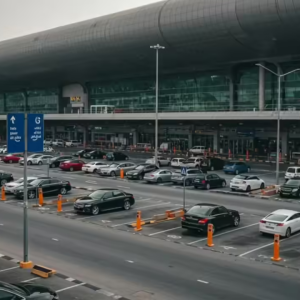In today’s rapidly evolving financial landscape, few leaders combine vision, expertise, and innovation the way Dr. Mohamed Amgad Mousa does. As the Deputy Chief Executive Officer of Al Dar for Exchange Works in Qatar, Dr. Mousa has been a driving force behind integrating financial technology and advancing customer-centric banking services. With nearly 15 years at Al Dar, he has witnessed firsthand the challenges and opportunities in bridging conventional banking systems with Islamic finance principles.
Recently, Dr. Mousa authored a comprehensive research paper exploring how conventional banks worldwide can successfully transition to Islamic finance. This effort reflects not only his deep academic knowledge but also his practical experience in financial technology, operations, and foreign exchange, fields profoundly impacted by Islamic finance principles.
The Motivation Behind His Research
Dr. Mohamed Amgad Mousa explains that his motivation stemmed from observing a global trend in the growth of Islamic finance. Over the last two decades, Islamic finance has expanded from a niche market into a sector managing more than $3 trillion in assets. While this growth is impressive, transitioning conventional banks to Islamic finance is far from straightforward. Some countries have successfully made the shift, while others have faced significant setbacks.

“For me, the research was about understanding what separates success from failure,” Dr. Mousa says. “Having built Qatar’s first FinTech app and working daily in foreign exchange, I’ve seen how deeply these principles impact real-world financial operations.”
The Five-Pillar Framework for Successful Conversion
Central to Dr. Mousa’s research is a “Five-Pillar Framework” designed to guide banks through conversion. Each pillar addresses a critical aspect of the transformation process, and all must work together to ensure success.

- Regulatory Infrastructure: Clear laws and tax neutrality are essential. Without them, banks face ambiguity that can hinder conversion and growth.
- Shari’ah Governance: Independent boards must ensure compliance is authentic rather than cosmetic, creating trust among customers and stakeholders.
- Operational Systems: Entire IT infrastructures need redesigning to support Islamic contracts rather than interest-based mechanisms.
- Liquidity Management: Islamic banks cannot rely on conventional interbank lending or interest-bearing instruments. Instead, they must use sukuk and specialized Islamic financial facilities.
- Transparency: Public disclosure of Shari’ah audits and profit allocation methods builds credibility, confidence, and long-term customer trust.
Dr. Mousa emphasizes that the conversion process is only as strong as its weakest pillar. Ignoring even one aspect can destabilize the entire transformation.
Lessons from Global Case Studies
Dr. Mousa’s research includes extensive analysis of countries like Malaysia, Indonesia, Pakistan, and several GCC nations. His findings reveal two surprising factors that consistently determine success: human capital and patience in profitability adjustment.
Human Capital Is Key
Even with strong technology and regulatory frameworks, banks can fail if staff do not understand Islamic finance principles. Malaysia’s success, for example, can be attributed in part to heavy investment in education, with hundreds of universities now offering dedicated programs in Islamic finance. Staff training and capacity building are therefore critical components of conversion.
Profitability Trajectory
Banks that transition to Islamic finance usually experience an initial decline in profitability due to restructuring costs. This decline typically lasts between 12 and 24 months. However, by the third to fifth year, these banks often achieve profitability parity with conventional banks and may even outperform them in stability and resilience. Patience and capital support during the early stages are crucial for long-term success.
Resilience During Crises
One of the most compelling findings in Dr. Mousa’s research is the resilience of Islamic banks during economic crises. During the 2008 financial crisis, conventional banks suffered due to exposure to speculative instruments and derivatives, while Islamic banks, bound by asset-backing principles, remained relatively stable.
“Islamic finance is inherently tied to real economic activity,” Dr. Mousa explains. “Speculation is prohibited, so banks avoid risky derivatives. This creates a fundamentally different risk architecture that proved far more stable during financial shocks.”
During the COVID-19 pandemic, the resilience of Islamic banks was again evident. Digital infrastructure, like Al Dar’s FinTech app, ensured continuous access to financial services. Additionally, profit-sharing models distributed risks rather than concentrating them, demonstrating a risk structure that was better suited for unprecedented challenges.
Technology as a Game Changer in Conversion
Technology plays a transformative role in Islamic banking. Traditional systems required extensive manual processes to track contracts, calculate profit-sharing, and ensure Shari’ah compliance. These processes were costly, error prone, and inefficient.
Today, innovations such as AI and blockchain are changing the game. AI can validate Shari’ah compliance in real time, while blockchain enables fully transparent and auditable transactions. Digital platforms also expand access to previously underserved populations, increasing financial inclusion.
At Al Dar, self-service kiosks and mobile apps have enabled 24/7 access to compliant financial services. Dr. Mousa underscores that technology does not replace governance; it enables it at scale.
The Post 2008 Paradigm Shift
The 2008 global financial crisis marked a turning point in banking. Conventional interest based systems, reliant on high leverage and speculative products, lost credibility. Meanwhile, younger, financially literate consumers began demanding ethical, transparent, and resilient banking alternatives.
Dr. Mousa’s research shows that over 60 percent of Muslim consumers would switch to Islamic banks if given the option. For conventional banks, this represents not just compliance but also a market opportunity to meet evolving consumer demands for ethical and stable financial services.
Key Challenges in Conversion
Converting conventional banks is a complex process with multiple obstacles.
- Legal Ambiguity: Many countries lack explicit recognition for contracts like murabaha or ijara, creating legal and tax complications.
- Liquidity Constraints: Without access to Islamic interbank facilities or sukuk markets, banks struggle to manage short-term liquidity.
- Partial Commitment: Some banks create “Islamic windows” without transforming core operations or culture. This superficial approach erodes public trust and rarely succeeds.
A Four Phase Roadmap for Conversion
To help banks navigate this transformation, Dr. Mousa outlines a four phase roadmap.
- Phase Zero Diagnostic: Conduct feasibility studies, align stakeholders, and secure regulatory engagement. Board commitment and central bank buy-in are essential.
- Phase One Governance: Establish independent Shari’ah boards, define approval processes, and secure necessary licenses.
- Phase Two Operational Migration: Redesign products, reconfigure IT systems, train staff, and convert existing assets.
- Phase Three Audit and Consolidation: Verify Shari’ah compliance, publicly disclose results, and monitor performance.
Dr. Mousa cautions that conversion takes three to five years. Rushing the process guarantees failure.
Islamic Finance and ESG: A Natural Fit
Islamic finance principles align closely with modern Environmental, Social, and Governance investing. The prohibition of harm, emphasis on social benefit, and requirement for tangible assets are core Islamic tenets that match today’s sustainability goals.
In recent years, initiatives such as green sukuk for renewable energy projects have gained momentum across the GCC. Research suggests ESG compliant Islamic portfolios often outperform conventional investments during economic downturns because they filter out high risk or exploitative ventures.
Dr. Mousa notes, “Islamic finance and ESG are not separate trends. They converge toward responsible, ethical capitalism.”
Implications for Qatar
Qatar is uniquely positioned to lead in Islamic finance. Strong regulatory frameworks, substantial sovereign wealth, and political support provide fertile ground for innovation. Recent Shari’ah Governance Instructions set high national standards.
However, Dr. Mousa believes Qatar can do even more. Expanding Islamic liquidity facilities, harmonizing standards across GCC markets, and integrating fintech with Islamic finance could make the country a global leader. At Al Dar, innovations in mobile apps and digital kiosks demonstrate that compliance and innovation can thrive together, serving as a national model.
Bridging the Knowledge Gap
Despite the growing importance of Islamic finance, only about 40 percent of banking staff in emerging markets truly understand its principles. Dr. Mousa stresses the need for continuous, practical education combining classical scholarship with modern analytics and risk management.
Qatar has taken steps with its National FinTech Talent Strategy, but similar initiatives focusing on Islamic finance would strengthen human capital and create a competitive advantage. Banks with well trained staff consistently outperform those treating Islamic finance as a regulatory formality.
Standardization Through AAOIFI and IFSB
Dr. Mousa’s research emphasizes international standards set by organizations such as AAOIFI and IFSB. These bodies provide Shari’ah, accounting, and governance guidelines, creating consistency across jurisdictions. Without standardized frameworks, cross-border operations would be chaotic, and conversions could fail. Banks adhering to these standards demonstrate higher transparency, lower risk, and stronger stakeholder confidence.
Learning from Failures
Half-hearted conversions often fail. Dr. Mousa cites examples from Egypt and Nigeria, where banks established Islamic divisions without systemic change. Staff continued to receive bonuses tied to interest based products, IT systems were inadequate for Islamic contracts, and Shari’ah boards had limited authority.
In contrast, successful conversions in Malaysia, Indonesia, and Pakistan were treated as full institutional transformations, not mere product line extensions.
The Future of Islamic Banking
Looking forward, Dr. Mousa envisions deeper integration of Islamic finance with fintech, including AI powered Shari’ah compliance, blockchain based sukuk, and digital wallets combining payments with charitable giving.
Islamic finance is also poised to play a pivotal role in sustainable development, renewable energy projects, financial inclusion for the unbanked, and ethical investment opportunities. Regulatory harmonization will further enable global competitiveness.
“Growth is inevitable,” Dr. Mousa emphasizes. “The question is whether institutions are preparing strategically or reacting passively.”
Message to Policymakers
Dr. Mousa’s advice to governments considering conversion mandates is clear.
- Do Not Rush: Legislate clearly, ensure tax neutrality, and build necessary liquidity infrastructure before mandating change.
- Invest in People: Skilled professionals who understand both Shari’ah and modern finance are the linchpin of success.
- Learn from Others: Study existing models, adapt best practices, and customize frameworks for local markets.
Conversions are not solely a religious or ethical exercise. They are an opportunity to create more resilient, transparent, and inclusive financial systems.
Balancing Leadership and Research
When asked how he balances his demanding executive role with doctoral research, Dr. Mousa laughs and says discipline and purpose make it possible. His research is not separate from his work. It informs and validates it. Every challenge studied in theory is applied in practice, creating a continuous feedback loop.
“Leaders must never stop learning,” he says. “Complacency is the first step toward obsolescence.”
Conclusion
Dr. Mohamed Amgad Mousa’s work offers a roadmap for conventional banks worldwide to transition to Islamic finance. By focusing on governance, technology, human capital, and ethical principles, institutions can achieve financial stability, transparency, and resilience. Qatar, with its robust infrastructure and forward thinking leadership, is well positioned to lead the way in this transformative journey.
Dr. Mousa’s vision illustrates that innovation and compliance can coexist, offering a model for the future of ethical banking globally.
Do follow him on LinkedIn
Read Next – Davidson Kempner Abu Dhabi: Hedge Fund’s Bold Relocation












